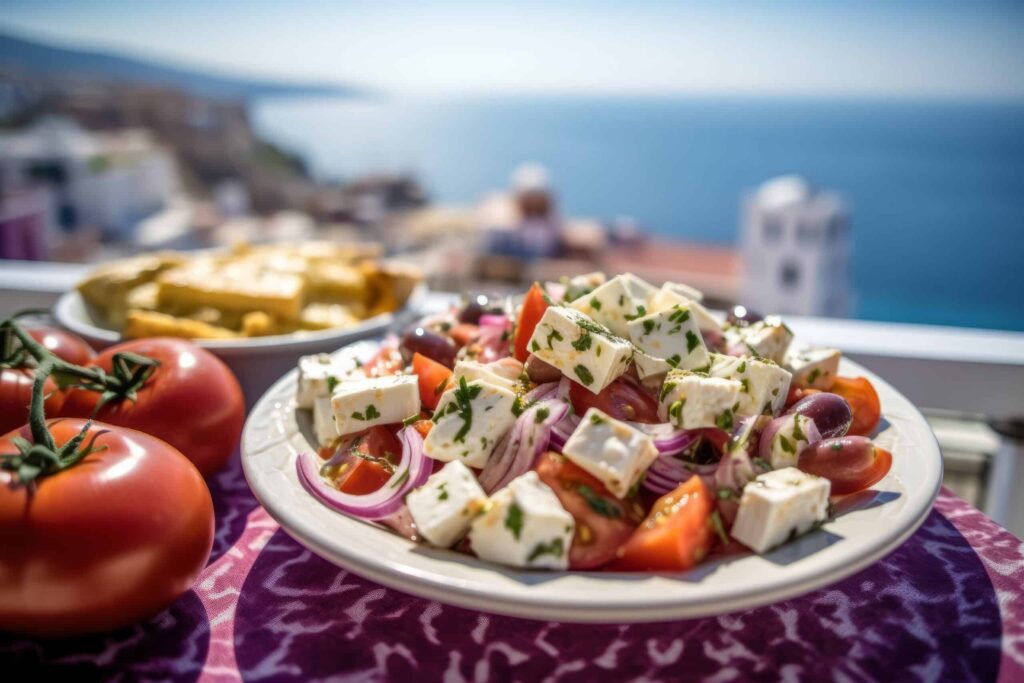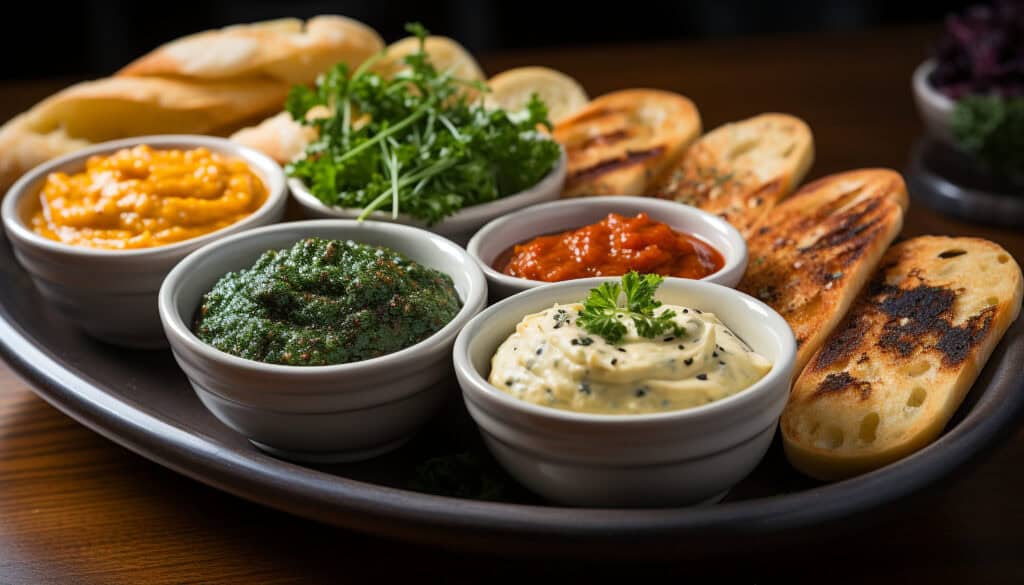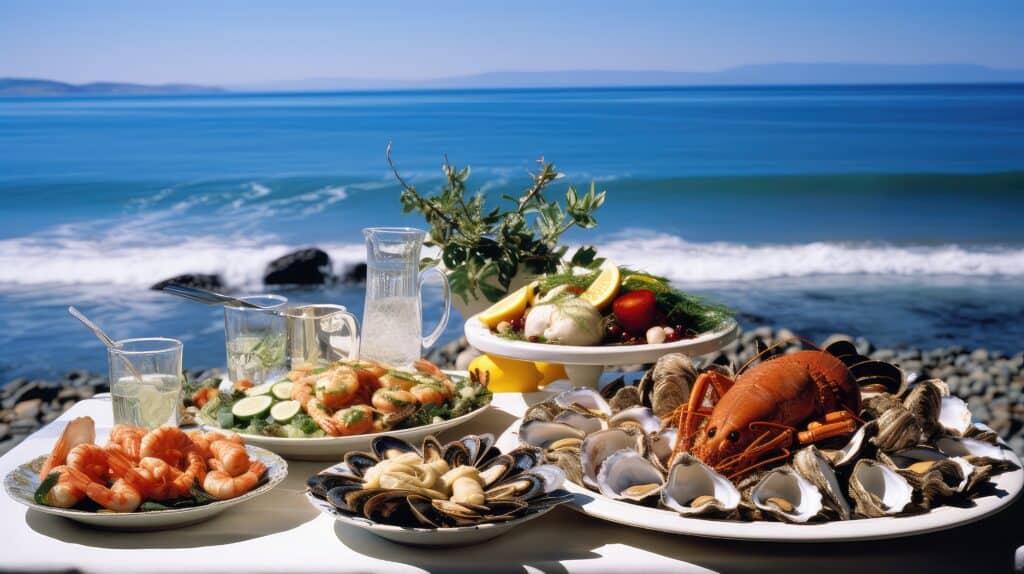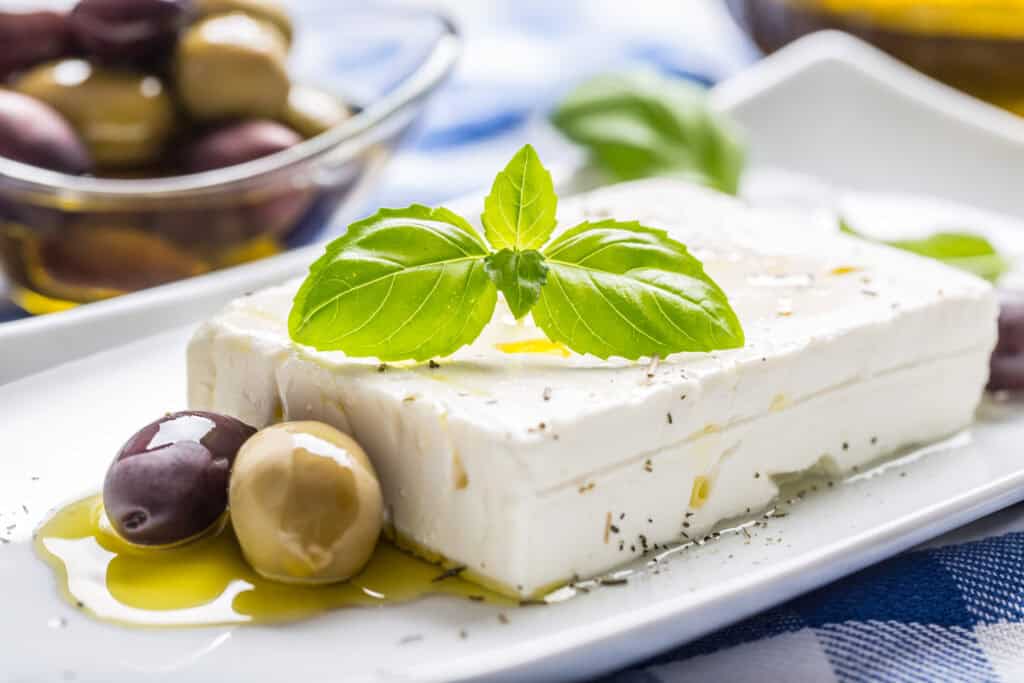Did you know that Greece has over 5,000 islands, but only around 200 are inhabited? Among the many treasures this Mediterranean paradise offers, its delectable cuisine, dining experience, and culinary experience stand out as true delights. From the iconic moussaka to the flavorful souvlaki and fresh seafood dishes, Greek food is a culinary journey that tantalizes taste buds and captures hearts worldwide.
Key Takeaways
- Explore the Richness of Greek Cuisine: Immerse yourself in the diverse flavors and ingredients of Greek food by trying a variety of dishes and drinks for a culinary experience.
- Indulge in Must-Try Greek Delicacies: Don’t miss out on iconic Greek dishes like moussaka, souvlaki, and baklava for an authentic culinary experience.
- Savor Signature Greek Drinks: Pair your meals with traditional Greek beverages such as ouzo, raki, or frappé coffee to enhance the authenticity of your dining experience.
- Discover the Top 10 Foods in Greece: From feta cheese to gyro, delve into the top culinary delights that Greece has to offer and expand your gastronomic horizons.
- Delight in Greek Seafood Specialties: Enjoy fresh seafood dishes like grilled octopus and shrimp saganaki that showcase Greece’s coastal culinary expertise.
- Appreciate the Role of Cheese and Olive Oil: Understand the significance of feta cheese and olive oil, adding depth and richness to various dishes.
Exploring Greek Cuisine
Rich History
Greek cuisine boasts a rich history that dates back centuries, influenced by various civilizations that have occupied the region. From the ancient Greeks to the Byzantines and Ottomans, each culture left its mark on Greek culinary traditions. The use of fresh herbs, olive oil, and an abundance of seafood reflects the country’s geographical location.
Mediterranean Influence
The Mediterranean spices play a significant role in shaping Greek dishes. The liberal use of olive oil, lemon juice, oregano, and garlic creates a distinct taste profile that is both flavorful and healthy. The emphasis on using locally sourced ingredients ensures that dishes are not only delicious but also nutritious.
Cultural Significance
Food holds immense cultural significance in Greece, where meals are seen as a time for family and friends to gather and bond over shared dishes. Traditional Greek meals often consist of multiple courses, starting with appetizers like tzatziki and dolmades, followed by main courses such as moussaka or souvlaki, and ending with sweet treats like baklava or galaktoboureko. Each dish tells a story of Greece’s past and present, showcasing the country’s diverse culinary heritage.
Must-Try Greek Dishes
Mezze Platter
Mezze platters are a staple in Greek cuisine, featuring an array of small dishes perfect for sharing. Common components include hummus, tzatziki, olives, and grape leaves stuffed with rice and herbs. The variety ensures there’s something for everyone to enjoy.
Standout Dish
One standout dish that encapsulates the flavors of Greece is Moussaka. This hearty casserole layers eggplant, minced meat, and creamy béchamel sauce, creating a harmonious blend of textures and tastes. It’s a must-try for those seeking a truly authentic Greek dining experience with flavors.
Side Dish
When it comes to choosing a side dish, Spanakopita is a great option. This savory pastry combines spinach, feta cheese, onions, and herbs encased in flaky phyllo dough. Its rich flavors make it the perfect choice to accompany any main course.
Unique Ingredients
Greek cuisine is characterized by its use of fresh and flavorful ingredients such as olive oil, feta cheese, yogurt, and an abundance of herbs like oregano and mint. These ingredients not only add depth to the dishes but also contribute to the overall health benefits associated with the Mediterranean diet.
Popular Greek Recipes
Exploring popular Greek recipes unveils the secrets behind dishes like Souvlaki, marinated skewers of grilled meat typically served with pita bread and tzatziki sauce. Another favorite is Dolmades, grape leaves stuffed with a mixture of rice, pine nuts, herbs, and spices, showcasing the intricate flavors of Greek cooking.
Signature Greek Drinks
Traditional Beverages
Greek cuisine is not complete without its signature drinks, offering a unique taste of the country’s culinary culture and flavors. From strong coffee to refreshing lemon syrup, these beverages play a vital role in Greek dining traditions.
Embrace the bold flavors of Greek coffee, known for its robust taste and thick texture. This traditional drink is brewed by boiling finely ground coffee beans with water and sugar, creating a strong and aromatic beverage that is often enjoyed throughout the day.
Immerse yourself in the zesty sweetness of lemon syrup, a popular Greek drink that perfectly balances tangy citrus flavors with a hint of sweetness. This refreshing beverage is made by simmering fresh lemon juice with sugar until it forms a thick syrup, which is then diluted with water for a revitalizing treat.
Cultural Significance
Drinks hold significant cultural importance in Greek dining, symbolizing hospitality, friendship, and celebration. In Greece, offering guests a drink is a gesture of warmth and welcome, showcasing the country’s rich tradition of hospitality.
Experience the essence of Greek hospitality through the act of sharing drinks with friends and family. Whether sipping on strong coffee during lively conversations or enjoying lemon syrup on hot summer days, these beverages foster connections and create memorable moments.
Perfect Pairings
Pair your favorite Greek dishes with complementary beverages to enhance the flavors of your dining experience. Enjoy a cup of Greek coffee alongside traditional desserts like baklava or kataifi for a harmonious blend of flavors that satisfy your sweet cravings.
For a refreshing accompaniment to savory dishes, opt for lemon syrup mixed with water as a light and tangy drink that cleanses the palate between bites. The citrusy notes of this beverage complement grilled meats, seafood dishes, and fresh salads, adding a burst of flavor to every meal.
Top 10 Foods in Greece
Traditional Delicacies
Greek cuisine is renowned for its rich flavors and diverse ingredients, reflecting the country’s history and culture. When visiting Greece, try traditional delicacies like moussaka, a layered dish of eggplant, minced meat, and béchamel sauce.
Indulge in souvlaki, a popular street food consisting of grilled meat skewers served with pita bread and tzatziki sauce. For a taste of the sea and flavors, savor fresh seafood dishes such as grilled octopus or fried calamari by the beach.
Mediterranean Ingredients
Incorporating Mediterranean ingredients like olive oil, feta cheese, and fresh herbs, Greek cuisine offers a unique culinary experience with flavors. Enjoy horiatiki, a classic Greek salad featuring tomatoes, cucumbers, onions, olives, and creamy feta cheese.
Relish the flavors of spanakopita, a savory pastry filled with spinach, feta cheese, and herbs wrapped in flaky phyllo dough. Don’t miss out on trying this flavorful dish of dolmades, grape leaves stuffed with rice, pine nuts, and aromatic herbs.
Sweet Treats
For those with a sweet tooth, Greece offers an array of delectable desserts. Sample baklava, a heavenly pastry made of layers of phyllo dough filled with chopped nuts and sweetened with honey syrup. Indulge in Loukoumades, small honey-soaked donuts sprinkled with cinnamon.
Experience the delight of galaktoboureko, a custard-filled pastry topped with crispy phyllo and sweet syrup. Treat yourself to a cup of traditional Greek coffee paired with a slice of revani, a moist semolina cake flavored with orange zest.
Culinary Heritage
Greek cuisine is deeply rooted in tradition and history, showcasing the country’s culinary heritage through each dish. Embrace the warmth of Greek hospitality as you dine on flavorful dishes passed down through generations.
Immerse yourself in the vibrant food culture of Greece by exploring local markets brimming with fresh produce and authentic ingredients. Witness the artistry of Greek chefs as they skillfully prepare dishes that celebrate the essence of Mediterranean gastronomy.
Greek Seafood Delights
Fresh Options
Greek cuisine is renowned for its fresh seafood, offering a diverse array of options along the stunning Greek coastline. From whole fish to grilled calamari, the choices are abundant.
The coastal regions of Greece boast an abundance of fresh ingredients that are skillfully incorporated into various seafood dishes. The use of fresh vegetables and flavorful meat ensures a delightful combination in every dish.
Traditional Cooking Methods
Greek seafood delights are often prepared using traditional cooking methods that have been passed down through generations. Grilled seafood dishes, such as grilled calamari, highlight the simplicity and richness of flavors in Greek cuisine.
In Greece, seafood soups like fricassée are cooked to perfection, infusing the broth with the essence of the sea. The addition of rice and sesame seeds adds depth to these dishes, creating a unique taste that captivates diners.
Exquisite Flavors
When dining at Greek restaurants, one can expect to savor true delight in every bite of seafood. The rich flavors derived from fresh ingredients and expert culinary techniques make Greek seafood dishes a gastronomic experience like no other.
- Pros:
- Abundance of fresh seafood options
- Skillful incorporation of fresh ingredients
- Rich flavors and delightful combinations
- Cons:
- Limited availability in landlocked areas
- Pricing may vary based on location
From grilled delicacies to sumptuous soups, Greek seafood offers a culinary journey filled with delicious dishes that celebrate the bounty of the sea.
The Cheese and Olive Oil Tale
Greek Cheeses
Greek cheeses are a cornerstone of the Mediterranean diet, with cheese lovers worldwide cherishing their unique flavors. Feta, made from sheep’s milk, is a popular choice known for its tangy taste and crumbly texture. Another favorite is Kasseri, a versatile cheese perfect for grilling or melting into dishes.
Exploring the world of Greek cheeses reveals a diverse range beyond Feta and Kasseri. Graviera, a sweet and nutty cheese aged for at least five months, adds depth to dishes like Saganaki. Spinach and cheese pies called Spanakopita often feature salty Feta paired with leafy greens in flaky phyllo dough.
Olive Oil in Greek Cooking
Olives have been cultivated in Greece for over 6,000 years, shaping the country’s culinary landscape. Olive oil is a staple in Greek cooking, offering a rich flavor profile and numerous health benefits. Rich in monounsaturated fats and antioxidants, olive oil is linked to reduced inflammation and improved heart health.
In traditional Greek cuisine, olive oil is not just an ingredient but a symbol of prosperity and peace. It enhances dishes like dolmades, grape leaves stuffed with rice and herbs then drizzled with lemon juice and olive oil. The iconic Greek salad showcases olives swimming in a sea of olive oil alongside fresh tomatoes, cucumbers, and creamy feta cheese dish.
Health Benefits
The use of olive oil in Greek cooking goes beyond flavor; it also brings numerous health benefits to the table. Extra virgin olive oil contains high levels of antioxidants that protect cells from damage caused by free radicals. Its anti-inflammatory properties can help reduce the risk of chronic diseases like heart disease and stroke.
Incorporating olive oil into your diet can lead to improved cardiovascular health due to its ability to lower bad cholesterol levels. The monounsaturated fats found in olive oil promote satiety and may aid in weight management by keeping you feeling full longer.
Sweet Temptations in Greece
Unique Ingredients
Greek desserts are renowned for their sweet treats that tantalize the taste buds. These delectable creations often feature a harmonious blend of traditional ingredients like cinnamon, honey syrup, and powdered sugar. The use of these elements imparts a distinct flavor profile to each dessert.
Cultural Significance
Desserts hold a special place in Greek culture, often being reserved for special occasions such as weddings, holidays, and family gatherings. These sweet indulgences symbolize joy, togetherness, and celebration. Moreover, offering dessert to guests is considered a gesture of hospitality and warmth in Greek households.
Homemade Delights
In Greece, many desserts are prepared at home, following age-old recipes passed down through generations. This tradition not only ensures the preservation of authentic flavors but also fosters a sense of connection to the past. From classic baklava dripping with syrup to delicate loukoumades dusted with sugar, homemade Greek desserts offer a glimpse into the country’s rich culinary heritage.
Traditional Greek Meals
Communal Dining
Greek meals are not just about food; they embody a sense of community and togetherness. Families gather around the table, sharing stories and creating lasting bonds over delicious dishes.
Embracing the concept of symposia, Greek meals encourage social interaction, fostering connections among family members and friends. The act of sharing food symbolizes unity and strengthens relationships.
Culinary Traditions
Rooted in centuries-old customs, traditional Greek meals reflect the country’s rich history and diverse influences. From using simple ingredients to preparing elaborate feasts, each dish tells a unique story.
The use of fresh herbs, locally sourced meat, and seasonal produce highlights the importance of quality and flavor in Greek cuisine. Whether it’s succulent beef dishes or hearty stews, every meal is a celebration of taste and tradition.
Rituals and Traditions
In Greece, mealtimes are more than just eating; they are rituals steeped in tradition. From the ceremonial breaking of bread to the symbolic significance of certain dishes, every aspect of dining holds cultural importance.
The inclusion of wild greens in many recipes pays homage to the country’s connection to nature and its bounty. These foraged greens not only add depth to the flavors but also showcase the resourcefulness of Greek cooking.
Closing Thoughts
You’ve now journeyed through the vibrant tapestry of Greek cuisine, from savory dishes to sweet delicacies. Embrace the flavors of Greece and let your taste buds revel in the Mediterranean symphony of tastes and aromas. Whether you’re a food enthusiast or an adventurous eater, Greece offers a culinary experience like no other.
Take this opportunity to explore Greek cuisine firsthand. Visit local Greek restaurants, try out traditional recipes at home, or even plan a trip to Greece to savor these delectable treats in their place of origin. Let the magic of Greek food transport you to sun-kissed shores and picturesque villages. The culinary wonders of Greece await – indulge your senses and embark on a gastronomic adventure!
Frequently Asked Questions
What are some must-try Greek dishes?
Greek cuisine offers a variety of must-try dishes like moussaka, souvlaki, tzatziki, spanakopita, and baklava. These dishes showcase the rich flavors of Greece and are popular among locals and tourists alike.
What are the top 3 signature Greek drinks?
The top 3 signature Greek drinks to try are Ouzo, Retsina, and Frappé coffee. Ouzo is an anise-flavored spirit, Retsina is a unique pine resin-infused wine, and Frappé coffee is a frothy cold coffee delight.
Can you list the top 5 foods to try in Greece?
Top 5 foods to try in Greece include moussaka, souvlaki, feta cheese, olives, and Greek yogurt. These traditional foods capture the essence of Greek flavors and culinary heritage.
What are some popular seafood delights in Greek cuisine?
Popular seafood delights in Greek cuisine include grilled octopus, fried calamari, shrimp saganaki, seafood risotto, and stuffed squid. Seafood plays a significant role in Mediterranean diets and offers fresh and flavorful options.
Which sweet temptations should one not miss in Greece?
When in Greece, do not miss trying loukoumades (honey puffs), galaktoboureko (custard pastry), baklava (nutty dessert), kataifi (shredded dough with nuts), and pasteli (sesame seed bar). These sweet treats offer a delightful end to a meal or as snacks throughout the day.







